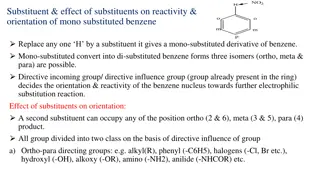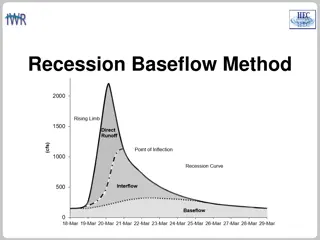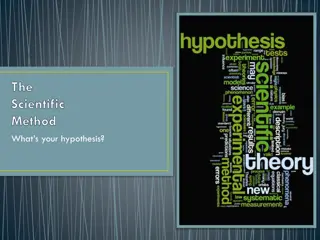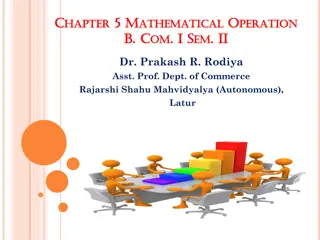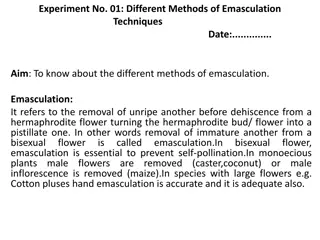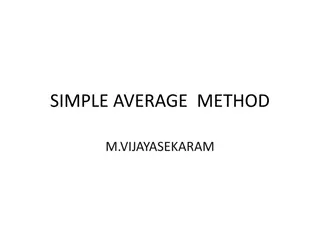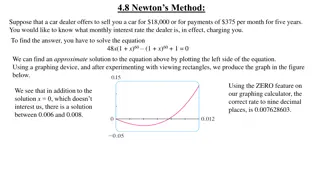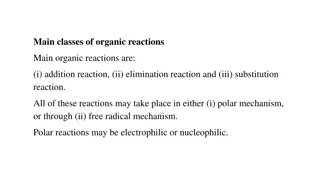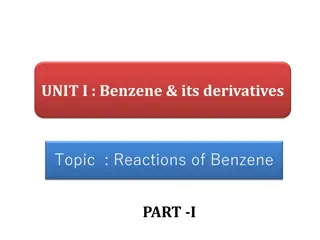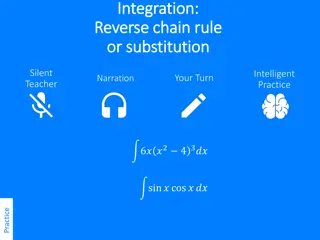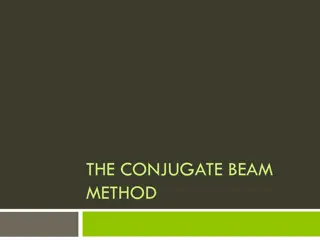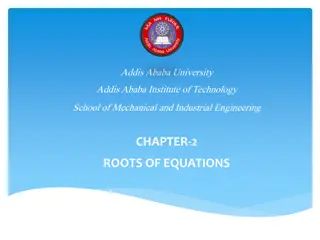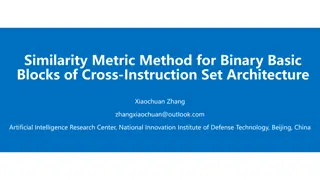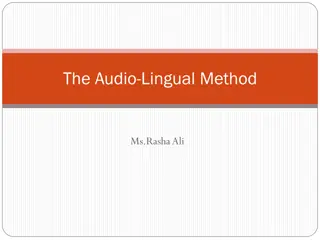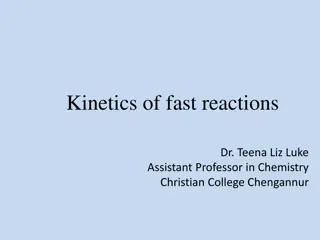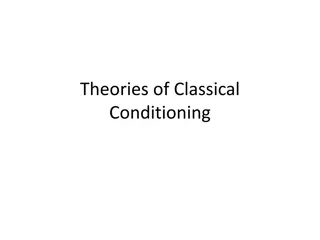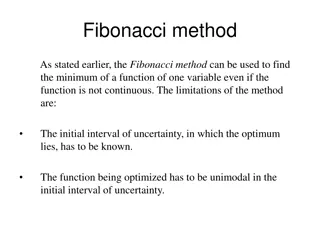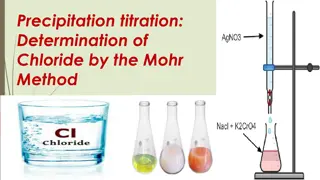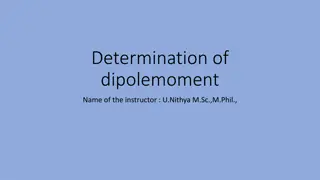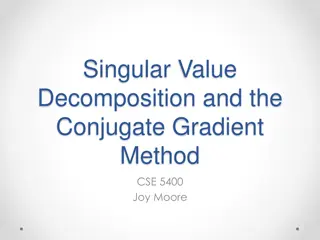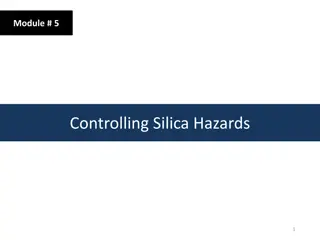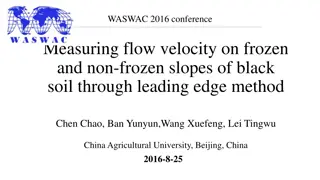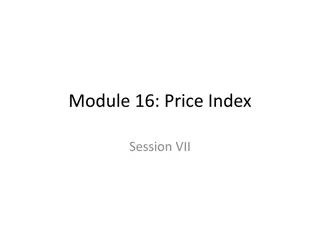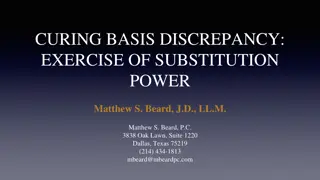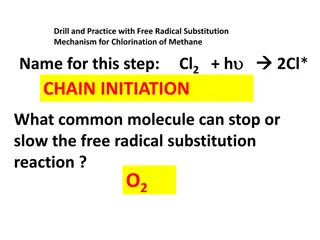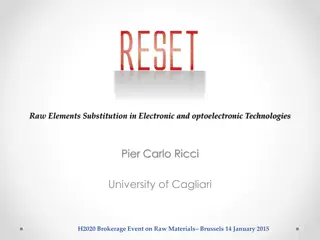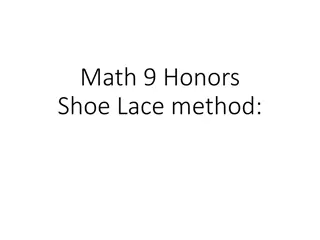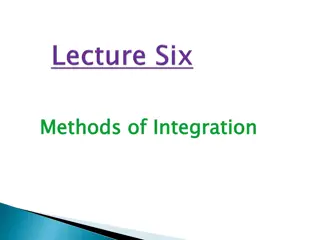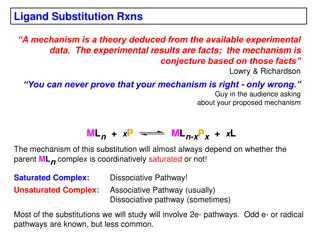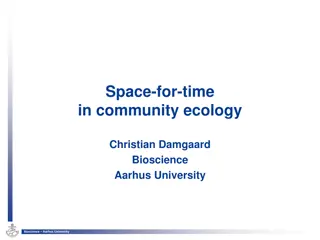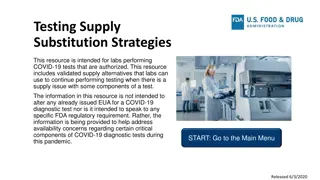Language Teaching Techniques: GTM, Direct Method & Audio-Lingual Method
Explore the Grammar-Translation Method, Direct Method, and Audio-Lingual Method in language teaching. Understand principles, objectives, and methodologies with insights into language learning approaches. Enhance teaching skills and foster effective communication in language education.
3 views • 82 slides
Module C1:Material substitution.
Explore the concept of material substitution in the context of circular economy principles for energy storage. Understand the importance of material availability, limitations of secondary raw materials in energy applications, and classification of energy conversion and supportive materials. Discover
5 views • 16 slides
Substituent Effects on Benzene Reactivity and Orientation
Substituents in benzene derivatives influence reactivity and orientation in electrophilic substitution reactions. They can be classified as ortho-para directing or meta directing based on their effect. Ortho-para directing groups increase electron density and activate the ring, while meta directing
7 views • 14 slides
Understanding the Recession Baseflow Method in Hydrology
Recession Baseflow Method is a technique used in hydrology to model hydrographs' recession curve. This method involves parameters like Initial Discharge, Recession Constant, and Threshold for baseflow. By analyzing different recession constants and threshold types such as Ratio to Peak, one can effe
0 views • 8 slides
Understanding the Scientific Method: A Logical Framework for Problem-Solving
The Scientific Method is a systematic approach used to solve problems and seek answers in a logical step-by-step manner. By following key steps such as stating the problem, researching, forming a hypothesis, testing, analyzing data, and drawing conclusions, this method helps clarify uncertainties an
1 views • 18 slides
Introduction to Six Thinking Hats Method for Effective Group Decision Making
Explore the Six Thinking Hats method, a powerful tool for facilitating group discussions and decision-making processes. This method encourages participants to approach problems from various perspectives represented by different colored 'hats'. By simplifying thinking and fostering constructive dialo
1 views • 24 slides
Understanding Corn Growth Stages: Leaf Staging Methods and Considerations
Various leaf staging methods, including the Leaf Collar Method and Droopy Leaf Method, are used to identify corn plant growth stages. The Leaf Collar Method involves counting leaves with visible collars, while the Droopy Leaf Method considers leaves at least 40-50% exposed from the whorl. Factors li
0 views • 9 slides
Mastering Symbol Substitution in Mathematical Operations
In the realm of mathematical operations, understanding symbol substitution is key to solving questions efficiently. Learn how to interchange mathematical signs and symbols to find the correct answer. With examples and guidance, grasp the concept of symbol substitution and excel in tackling such ques
0 views • 25 slides
Understanding Different Emasculation Techniques in Plant Breeding
Learn about the significance of emasculation in plant breeding to prevent self-pollination and facilitate controlled pollination. Explore various methods such as hand emasculation, forced open method, clipping method, emasculation with hot/cold water, alcohol, suction method, chemical emasculation,
2 views • 10 slides
Simple Average Method in Cost Accounting
Simple Average Method, introduced by M. Vijayasekaram, is a technique used for inventory valuation and delivery cost calculation. It involves calculating the average unit cost by multiplying the total unit costs with the number of receiving instances. This method simplifies calculations and reduces
2 views • 5 slides
Understanding Newton's Method for Solving Equations
Newton's Method, also known as the Newton-Raphson method, is a powerful tool for approximating roots of equations. By iteratively improving initial guesses using tangent lines, this method converges towards accurate solutions. This method plays a crucial role in modern calculators and computers for
0 views • 12 slides
Overview of Organic Reactions and Mechanisms
Organic reactions can be categorized into addition, elimination, and substitution reactions, occurring through either polar or free radical mechanisms. Polar reactions may be electrophilic or nucleophilic, while free radical reactions involve radicals reacting to complete electron octets. Different
2 views • 26 slides
Understanding Benzene and its Electrophilic Aromatic Substitution Reactions
Aromatic compounds like benzene undergo electrophilic aromatic substitution reactions (EAS). This process involves the reaction of an electrophile with the aromatic ring, leading to the formation of various derivatives. Examples include halogenation, nitration, and sulphonation of benzene, each with
0 views • 13 slides
Integrating Reverse Chain Rule and Substitution in Calculus
Explore the concepts of reverse chain rule and substitution in integration through worked examples and practice questions involving trigonometric functions. Enhance your skills with interactive narration and practical exercises. Dive into the world of calculus with a silent teacher guiding you throu
0 views • 5 slides
Understanding the Conjugate Beam Method in Structural Analysis
The Conjugate Beam Method is a powerful technique in structural engineering, derived from moment-area theorems and statical procedures. By applying an equivalent load magnitude to the beam, the method allows for the analysis of deflections and rotations in a more straightforward manner. This article
1 views • 11 slides
Understanding Roots of Equations in Engineering: Methods and Techniques
Roots of equations are values of x where f(x) = 0. This chapter explores various techniques to find roots, such as graphical methods, bisection method, false position method, fixed-point iteration, Newton-Raphson method, and secant method. Graphical techniques provide rough estimates, while numerica
0 views • 13 slides
Binary Basic Block Similarity Metric Method in Cross-Instruction Set Architecture
The similarity metric method for binary basic blocks is crucial in various applications like malware classification, vulnerability detection, and authorship analysis. This method involves two steps: sub-ldr operations and similarity score calculation. Different methods, both manual and automatic, ha
0 views • 20 slides
Exploring the Audio-Lingual Method in Language Teaching
The Audio-Lingual Method is an oral-based approach that focuses on drilling students in grammatical sentence patterns through behavioral psychology principles. This method, also known as the Michigan Method, emphasizes habit formation and uses techniques like dialogues, repetition drills, and role-p
1 views • 16 slides
Understanding the Kinetics of Fast Reactions in Chemistry
Kinetic methods involve measuring analytical signals under dynamic conditions to study fast reactions in chemistry. This study explores the various methods used, such as Flow Method and Stopped Flow Method, to determine reaction rates accurately. Advantages of the Stopped Flow Method over Continuous
0 views • 18 slides
Theories of Classical Conditioning: Critical Concepts and Pavlov's Stimulus Substitution Theory
Understand the key aspects of classical conditioning, including the critical CS-US relationship and Pavlov's Stimulus Substitution Theory. Explore why organisms respond predictably, uncover criticisms and flaws in the theory, and delve into the bigger problem of selecting for certain conditioned res
0 views • 75 slides
ADFGVX Cipher: Encryption and Decryption Techniques
Discover the ADFGVX cipher, a historical encryption method used to secure messages during World War I. Learn about Fritz Nebel and Gino Painvin, who played significant roles in its development. Explore the Polybius Square invented by Polybius in the 2nd century BC for converting letters to numbers.
0 views • 14 slides
Understanding the Fibonacci Method for Function Optimization
The Fibonacci method offers a systematic approach to finding the minimum of a function even if it's not continuous. By utilizing a sequence of Fibonacci numbers, this method helps in narrowing down the interval of uncertainty to determine the optimal solution through a series of experiments. Despite
1 views • 19 slides
Determination of Chloride by Mohr Method
Precipitation titration is a volumetric method used for determining chloride ions. Mohr's method involves reacting alkaline or alkaline earth chlorides with silver nitrate in the presence of a potassium chromate indicator. The endpoint of the titration is signaled by the appearance of red silver chr
0 views • 9 slides
Determination of Dipole Moment in Chemistry
The determination of dipole moment in chemistry involves methods such as the Temperature Method (Vapour Density Method) and Refractivity Method. These methods rely on measuring various parameters like dielectric constants and polarizations at different temperatures to calculate the dipole moment of
1 views • 15 slides
Accounting Entries in Hire Purchase System for Credit Purchase with Interest Method
In the Credit Purchase with Interest Method of Hire Purchase System, assets acquired on hire purchase basis are treated as acquired on outright credit basis with interest. This method involves initial entries for recording the asset acquisition, down payments, interest on outstanding balance, instal
0 views • 10 slides
Understanding Singular Value Decomposition and the Conjugate Gradient Method
Singular Value Decomposition (SVD) is a powerful method that decomposes a matrix into orthogonal matrices and diagonal matrices. It helps in understanding the range, rank, nullity, and goal of matrix transformations. The method involves decomposing a matrix into basis vectors that span its range, id
0 views • 21 slides
Controlling Silica Hazards: Effective Engineering Controls
Techniques for controlling silica hazards in the workplace include elimination, substitution, and engineering controls like ventilation, dust containment systems, wet methods, and housekeeping practices. Elimination involves removing silica exposure risks, while substitution replaces risky materials
1 views • 21 slides
Enhancing Automation Efficiency through Substitution Variables
The University of Tennessee Health Science Center implemented automation in Financial Aid processes to reduce workload and improve efficiency. Learn how substitution variables, notifications, and PL/SQL procedures were utilized to streamline operations in this insightful session.
0 views • 35 slides
Measurement of Flow Velocity on Frozen and Non-Frozen Slopes of Black Soil Using Leading Edge Method
This study presented a detailed methodology for measuring flow velocity on frozen and non-frozen slopes of black soil, focusing on the Leading Edge method. The significance of shallow water flow velocity in soil erosion processes was emphasized. Various methods for measuring flow velocity were compa
0 views • 23 slides
Price Index Session VII - Designing Price Data Collection System
This session delves into the process of designing a price data collection system, focusing on product specification, setting norms for item substitution, outlet selection, determining frequency and timing, method of data collection, treatment of seasonal products, quality adjustment, and dealing wit
0 views • 47 slides
AQS Data Handling: Insights from AQS Conference August 2012
Delve into the intricacies of AQS data handling discussed at the AQS Conference in August 2012. Explore topics such as sample measurement rules, MDL substitution, rounding methods, acceptance/rejection criteria, standard value calculation, and more. Gain insights into the importance of data complete
0 views • 12 slides
Understanding Transition Bias and Substitution Models in Genetics
Transition bias and substitution models, explored by Xuhua Xia, delve into the concepts of transitions and transversions in genetic mutations, the causes of transition bias, the ubiquitous nature of transition bias in invertebrate and vertebrate genes, the mitochondrial genetic code, and RNA seconda
1 views • 25 slides
Understanding Substitution Power in Trusts: A Comprehensive Analysis
This document delves into the intricacies of substitution power in trust administration, discussing its significance, typical features, and implications. It covers the structure of substitutions, fiduciary duties, valuation considerations, documentation requirements, and scenarios involving refusal
0 views • 16 slides
Free Radical Substitution Mechanism in Methane Chlorination
Explore the detailed steps of the free radical substitution mechanism in the chlorination of methane, including chain initiation, propagation, and termination. Learn about the role of common molecules like O2 in slowing or stopping the reaction and discover how radical-radical recombination reaction
0 views • 10 slides
Raw Elements Substitution in Electronic and Optoelectronic Technologies Overview
Explore the advancements in raw elements substitution in electronic and optoelectronic technologies led by Pier Carlo Ricci from the University of Cagliari, focusing on key applications, research areas, and industry impacts. The project, coordinated by RESET, aims to enhance sustainability and innov
0 views • 12 slides
Understanding the Shoe Lace Method for Finding Polygon Areas
The Shoe Lace Method is a mathematical process used to determine the area of any polygon by employing coordinate geometry. By following specific steps, including organizing coordinates, multiplying diagonally, and adding columns in a certain manner, the method allows for a straightforward calculatio
0 views • 8 slides
Methods of Integration and Trigonometric Substitution
Explore methods of integration including integration by parts and trigonometric substitution. Learn how to apply these techniques to solve integrals involving logarithmic, trigonometric, and rational functions. Discover step-by-step processes and identities to simplify and evaluate various types of
0 views • 7 slides
Understanding Ligand Substitution Reactions in Metal Complexes
Ligand substitution reactions in metal complexes involve the replacement of one ligand with another, impacting the coordination around the metal center. The mechanism of these reactions, associative or dissociative, is influenced by factors like coordination saturation and electron count. Experiment
0 views • 20 slides
Understanding Space-for-Time Substitution in Community Ecology
Space-for-time substitution (SFT) is a method used to study slow ecological processes by assuming different sites are at various stages of development. This approach, famous for its role in ecological development, has been critiqued for its implicit use in testing hypotheses on ecological processes
0 views • 7 slides
COVID-19 Testing Supply Substitution Strategies Overview
This resource provides validated supply alternatives for labs conducting authorized COVID-19 tests to address availability concerns during the pandemic. It covers strategies for substitution of components in Real-time RT-PCR testing, specimen collection techniques, and acceptable swab and media choi
0 views • 22 slides


